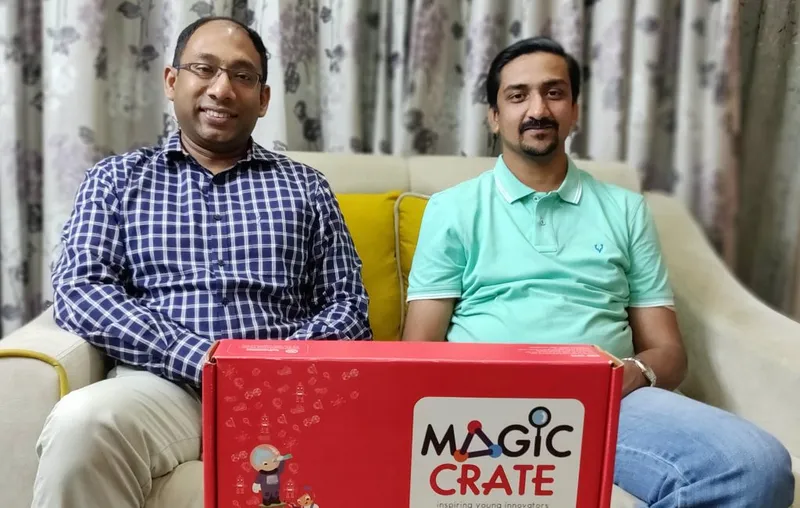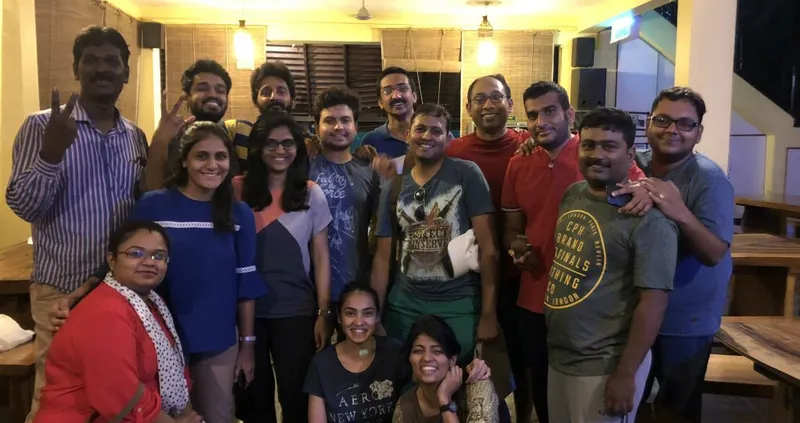Box of joy - Magic Crate offers fun learning activities for children
Bengaluru-based edtech startup offers activity-based learning for children; helps parents engage them in fun and interesting ways.
At a Glance
Startup: Magic Crate
Founders: Viswanathan R and Karthik Lakshman
Year it was founded: January 2015
Where it is based: Bengaluru
Sector: Edtech
The problem it solves: Provides activity-based learning for kids
Funding raised: Funded
Young fathers Viswanathan R and Karthik Lakshman found that engaging their toddlers productively at home while juggling work was not child’s play.
Instead of falling back on television or gadgets as busy parents tend to do in the urban scenario, the duo decided to think out of the box and explore the edtech space.
The idea, however, came with its own set of challenges.
“Children just want to play. They want something new and different every time. Even if we buy them the most expensive toy, chances are that they will lose interest in no time,” Viswanathan says.
Viswanathan and his childhood friend Karthik conceptualised Magic Crate with the idea of making learning fun. The company was set up in Bengaluru in 2015.
“I realised there were no large and established brands to cater to children up to eight years of age. There was also no large direct-to-home consumer brand in this space,” he explains.

Opening a treasure trove
Viswanathan graduated from IIT Varanasi and holds a management degree from IIM Kozhikode. Before starting up, he was part of the senior management team at Tutorvista, an online tutoring platform, and led the business development efforts for its school division.
Karthik graduated from Georgia Institute of Technology and ran operations at Coca-Cola, GE and HP. He also spent five years at management consulting firm Mckinsey & Co where he led the sales strategy and analytics teams. After returning to India, he started a food ordering startup in 2014, but had to shut it down.
Karthik had put together a tech and digital marketing team for the food delivery startup, and Viswanathan had started to put together a product design and supply chain team in place for Magic Crate when the duo decided to join forces. They launched the Magic Crate website in January 2015.
While Viswanathan looks after product design, supply chain, operations, finance, and investor management at the company, Karthik handles digital marketing, technology, and ecommerce sales.
The company has a multi-disciplinary team of early childhood experts, product designers, and toy and game designers. They started with a team of five, and now has 135 employees on their rolls.
Toys for fun and development
Magic Crate ships crates to customers with three to four interesting activities, based on science, arts, role play, and games, every month. The crates also contain storybooks. The reward for each activity is a toy or an artefact.

“Our products not only build important skills like critical thinking, problem-solving, and creativity, but also enable parents to engage their children in a fun way. We use the latest in design thinking and pedagogical research to build immersive learning experiences for children across multiple age groups,” says Viswanathan.
“Since day one, we have been focused on customer feedback. This will continue to be the case as we scale our business,” he adds.
The founders stress that their focus on age-specific and design-led products help in a child’s overall development. The startup has also tied up with schools to supply its products to children up to the age of 14.
“Parents value educational outcome as it builds conceptual understanding, is aligned with the school curriculum and is convenient as products are delivered to the doorstep,” Viswanathan says.
Thinking out of the box
Talking about what sets them apart from competitors that include players like Flintobox, Xplorabox, and Curositi, Viswanathan says,
“Our focus is on design-led thinking. Our product designs and an iterative development process have allowed us to build a large portfolio of products in a very short time. These products are loved by children and parents alike.”
He says Magic Crate caters to a very demanding customer – the child. “Designing products that children of different age groups love and keep coming back to is a huge challenge. Another challenge has been to build our brand in a cost-efficient way.”
Different experiences for different needs
Magic Crate offers three-month, six-month and 12-month subscription plans. The average cost of a crate is around Rs 500 a month. The company works on a subscription model, and shipped around 27,000 crates in June this year.

So far, the company has raised three rounds of funding. It raised a seed round from Mohandas Pai in 2015, and the proceeds were used to build more products for different age groups.
Subsequently, Magic Crate raised two more rounds of funding; the latest round was led by Fireside ventures. The funds have been used to expand and improve its product line, and to build awareness about the product.
“Magic Crate has been unit profitable for over a year, thanks to our strong repeat rates and 50 percent plus gross margins. With the business vertical scaling well with strong unit economics, we are now working on launching exciting new products to our customer base,” Karthik says.
“Within three years of the launch, our products have impacted over one lakh children, and we have crossed an annual revenue of over $2 million,” Viswanathan adds.
According to reports, the average annual expenditure on toys/gifts per household in India stands at Rs 2,400-3,000. The global market for scientific and educational toys is worth $2.7 billion.
In the short term, the company is focused on scaling its ecommerce business. In the medium-to-long term, it sees itself as a multi-channel, multi-product company with an international presence.







